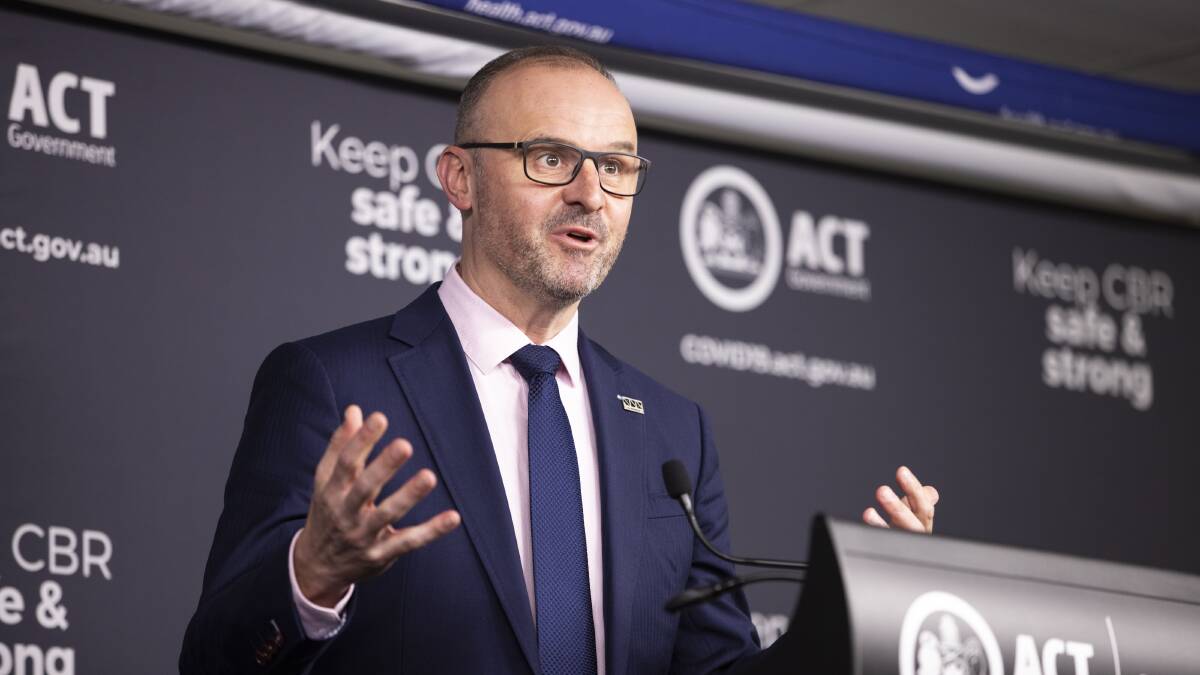Chief Minister Andrew Barr has pledged free rapid COVID-19 tests will be in place before ACT students return to classrooms, but there is still no guarantee that will be on day one of the school year.
Mr Barr said distributing free rapid antigen tests in schools will also ease the pressure on scarce supplies in the private market and make it easier for others to buy the kits.
However, the precise detail on how school will return at the start of Term 1 in just over a week is still to be determined and whether students can commence the year will depend on supplies of testing kits arriving.
The ACT cabinet will meet on Monday morning to discuss arrangements for the return.
The government on Thursday delayed an announcement of the safety arrangements that would be in place for students and staff at the start of the school year, amid concerns about rapid test supplies.

"One of the factors that's impacting on our decision making is I want to know that those tests are in the country," Mr Barr told The Canberra Times.
"It's an achievable logistical task for us to send a truck to Sydney or Melbourne to pick them up, it's a whole other thing if they haven't arrived in Australia."
Emergency Services Agency staff were tasked with picking up 135,000 rapid test kits from Sydney on Thursday night, with more than 1.5 million expected to arrive in Canberra over the next week.
The arrival of those tests put the ACT in a "very strong position" to provide diagnostic kits to teachers, Mr Barr said.
The Chief Minister said the ACT was working with NSW and Victoria to order rapid tests and to align arrangements in schools to achieve cross-border consistency.
"It's just, obviously, much more economically and logistically efficient for the ACT to add a million to a 20 million order than it is for us to go and be procuring them separately," he said.
Prime Minister Scott Morrison on Thursday announced the Commonwealth would split the cost of rapid tests used in schools for surveillance testing equally with states and territories.
However, it is up to the states and territories to secure the required testing kits for schools.
Mr Barr said: "Money is not an issue here. It is simply getting our hands on the kits. And so I want to make the right decision around testing, surveillance and otherwise."
The Chief Minister acknowledged surveillance testing was not a requirement for opening schools under health advice, but it was "nice to have".
"In an industrial context, clearly education unions have made it an issue as it relates to workforce health and safety, which is an entirely legitimate and appropriate point that you would expect the representatives of teachers to make," Mr Barr said.
The Australian Education Union, which represents public school teachers in the ACT, has previously indicated the supply of free rapid tests in schools was a critical issue for its members.
Mr Barr said supplying free rapid tests in schools, to both staff and students, would have positive flow-on effects in the community, reducing demand on the private market.
"Every effort and every time we can extract some more Commonwealth support to make more tests available for more people, I think, on balance, that is a net positive. ... More tests in schools means it will be easier for pensioners, for people with a disability [and others] to access more tests as well," he said.
Health authorities in the ACT are hopeful the start of term 1 will come after a peak in the territory's outbreak of Omicron COVID-19 cases.
The ACT reported 826 new COVID-19 cases on Friday, along with two deaths: two men, aged in their 60s and 90s.
It was the lowest number of cases since January 5.
Mr Barr said the latest data from the ACT outbreak appeared to indicate the peak was passing.
"It would mean a new wave was taking off, if all of a sudden we were back at 1800 or 2000 [cases] in a day," he said.
Australian Education Union ACT secretary Patrick Judge earlier this week said the lack of relief teachers to cover for sick or isolating teachers was the biggest issue schools were facing.
"Indications are we need to be preparing for the possibility of remote learning at the very least," Mr Judge said earlier this week.
"It's going to be very challenging for schools to continue in person."
School authorities and stakeholders were tight lipped on Friday as discussions continued to determine return-to-school plans.
South Australia and Tasmania have already released plans on how schools will return, with Tasmania committing to provide rapid antigen tests to symptomatic staff and students, and mandating masks for secondary students and staff.
South Australia will differentiate between "classroom contacts" and close contacts. Asymptomatic classroom contacts will be able to keep coming to school while asymptomatic close contacts will be able to attend on a test-to-stay arrangement with rapid test kits.
with Sarah Lansdown







